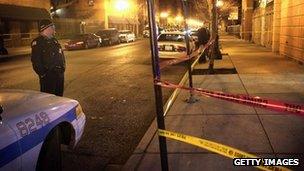Obama gun control plan raises hopes in Chicago
- Published
- comments
chicago guns
The superintendent of Chicago police produces a brown bag with a flourish. Inside is what he sees as part of his city's problem.
Part of the reason, he thinks, that 506 people were shot dead last year, part of the reason police seized 7,400 illegally held guns in 2012, part of the reason that since the Newtown massacre of school children more than 20 people have been shot dead in Chicago.
I'm keeping it vague because the number keeps changing - I know it was 24 last Thursday and at least three have died since then.
Superintendent Gary McCarthy produced a short, stubby weapon.
Interpreting the second amendment
"We had some of our gang officers witness a hit-and-run and when they went to stop the vehicle, a man leaned out the window and fired an Uzi-type firearm at the officers," he said.
"This is what we are talking about: the weapon is a 9mm with an extended clip with at least 30 bullets. A military-type weapon on the streets of Chicago."
He is flanked by four other colleagues in dark uniforms heavy with gold braid and badges.
They have been invited to a meeting on gun control by Democratic senator for Illinois, external, Dick Durbin.
Tim Makris, co-founder of Sandy Hook promise: "We want to encourage a national discussion"
They all hope the shock of the horrific Newtown murders will jolt America into tightening its gun laws.
They will be listening eagerly to President Barack Obama's proposals on Wednesday.
Chicago is at the heart of the debate.
While the names Newtown, Aurora, Columbine, are engraved on the world's imagination, the slow, steady drum beat of killings in this city add up to a Newtown-sized massacre every three weeks.
It was this city that tried to impose a ban on handguns and had it struck down by the US Supreme Court two years ago.
This has had huge implications. It used to be possible to argue that the constitution's second amendment meant what it said: that Americans had the right to bear arms because "a well-regulated militia [is] necessary to the security of a free state".
Some used to argue that now America has the biggest standing army the world has ever known it was a little bit redundant.
That doesn't now hold water. The Supreme Court ruled that it did indeed mean Americans had the right to own guns for their own protection.
Chicago is central in another way too. Those who are against gun control say this city has the tightest gun control laws in the country, proof positive that such restrictions do not touch the crime rate.
'Drawing the line'
The lawmen around the table reject that. They say that they need new laws, which are little more than common sense.

Chicago has seen more than 20 shot dead in 2013
It should be a legal requirement to report the theft or loss of a gun.
There should be background checks for everyone who buys a gun - with no loopholes for gun shows.
There should be mandatory minimum sentences for having an illegal gun.
They think it is ridiculous that a state card, needed to buy a gun, can be revoked for the mentally ill or criminals but there is no power to seize their guns.
But above all, Superintendent McCarthy says assault weapons should be banned.
"The second amendment gives us the right to bear arms. But in a civilised society we all understand we shouldn't have hand grenades, rocket launchers, mortars and cannons, right?
"So the question becomes where do we draw the line?"
He points at the short gun lying on the table. "This is not a reasonable gun to be on the streets of our nation. AK-47s with rounds that can go through the engine block of a car, they are military grade weapons, they are unreasonable in a civilised society."
The Illinois State Rifle Association's Richard Pearson says this is wrong, and the last time there was a ban on assault rifles it did not work.
"It didn't do anything. It showed that in some places, the crime increased," he says.
"When you take firearms away from honest citizens, only the criminals have them. It's not something people want to think about, it's not supposed to be that way."
Democratic Congressman Bobby Scott says he believes reforms on background checks and mental health provision are likely
He adds: "One of the things that needs to happen in Chicago is private gun ownership needs to go up. That will stop a lot of these home invasions. The way you control these things in the initial stages is let people be armed."
The sheriff for Cook County, Thomas Dart, a rising Democratic politician, seems weary and frustrated at this line of argument.
He is responsible for law enforcement in the US' second biggest county, which covers much of Chicago and some suburbs. He tells me he feels like he is in a time machine going back to repeat the same old arguments.
"I was talking with the National Rifle Association for years, and I thought it was one of those monumental wastes of your breath," Sheriff Dart says.
"Because, can you conceivably give me one reason why this weapon should be allowed? And they would come up with some outrageously ludicrous scenario that had black helicopters, external woven in somewhere.
"But some of these people, the foil is on their head, external too tight, because discussion just gets to be so pointless."
The frustration, the mutual misunderstanding and the anger on both sides gets deeper.
But Chicago's senior police officers hope the president's proposals will eventually make a difference on their streets.